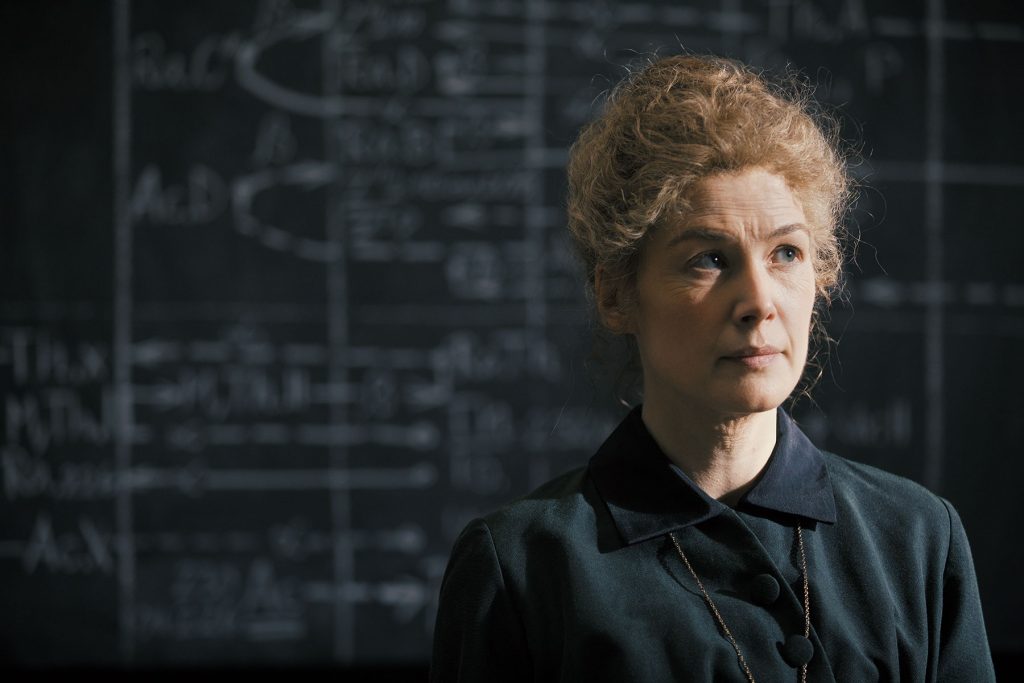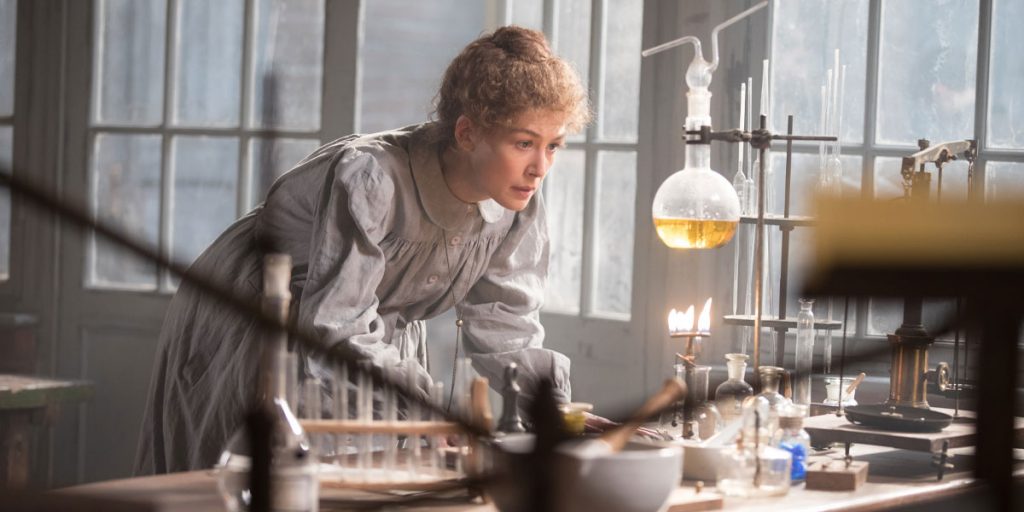Radioactive, despite a game lead performance and some creative touches, is tragically held back by a didactic, lazy screenplay.
Sometimes the best way to explain a movie is to describe one scene that is emblematic of the film’s virtues or problems. Radioactive is a biopic about brilliant scientist Marie Curie, who engaged in pioneering scientific work in the field of radioactivity. The film, however, is the sort where a major character questions the potential risks of radiation in Curie’s work only to see the film flash forward four decades to the inside of an airplane. Nameless characters spout military jargon – interspersed with a few key words the audience should know, such as “enola gay” – then, the film cuts to a small Asian boy running along the street. The city is Hiroshima and the year is 1945, as the film helpfully lets us know. We track the boy’s run across town until he throws his paper airplane. The camera tracks the boy’s plane until we see a black shape falling from the sky above… and then, an aerial shot of a mushroom cloud.
It is a startling lack of subtlety from a movie that is not exactly in the business of withholding any subtext from the text. In case you missed the point, future flash forwards will see the audience visit a 1961 nuclear test site and the 1986 Chernobyl disaster. “Radiation is dangerous!” the screenplay practically bleats. If you still were not paying attention, another character tells Curie near the film’s ending that she “invented a poison the whole world thinks marvelous.” It is truly execrable writing. There is not one moment in the film’s nearly two-hour running time that feels emotionally true, and I lay that at the feet of screenwriter Jack Thorne (The Aeronauts). The movie cannot quite decide what to make of Curie – is she a brilliant scientific expert or is she the harbinger of nuclear doom? It is a tragic indecision that plagues, and undercuts, this filmic version of Marie Curie.
It is really too bad, as the real Curie is a fascinating historical figure. The second woman to win a Nobel Prize and the first person to win two, she is responsible for numerous early discoveries in the field of radiation and atom structure. She is without question one of the most brilliant human beings to ever walk the Earth. Thorne’s script requires lead actress Rosamund Pike (Gone Girl) to vacillate from extreme autism to self-destructive hubris to passionate lover to all-encompassing obsession. In a film with a more cogently captured character arc, this could have been a tour-de-force performance. Pike does all she can to elevate the material and she is a stupendous actress generally, but nobody could have made this mess of clichés work.

Director Marjane Satrapi (Persepolis) and cinematographer Anthony Dod Mantle (127 Hours) do their best to enliven the proceedings with some visual flair. The eerie green glow of radium – kept by Curie’s bedside, of course – crafts a wonderful ominous dichotomy with the usual period blandness that accompanies every early 20th century BBC-style biopic. The film’s later acts see some genuinely strange dream sequences and surreal depictions of trauma that feel like a trailer for a far more interesting film. The movie has a lovely score and sound mix (from Steve Fanagan of Game of Thrones) as well: a futuristic series of computer-like sounds that seem like something from a 50s B-movie. It, too, serves as a lovely way to undercut the reality of turn of the century Parisian life with the essential modernity of Curie’s work.
I suspect wiser historians than I have made the argument that Curie’s discoveries denote a turning point in human history, but for the better and worse. I cannot help but hope that a different screenwriter – perhaps a woman next time – takes a run at encapsulating all the contradictions of her life. Marie Curie was a woman who struggled with Asperger’s yet fell into scandalous romance that become the talk of town. She was an obsessive scientist, but also a hero of the French efforts in World War I. She created a treatment for cancer and the opening to nuclear war. I find myself rambling about Curie because I’m captivated by the life I read about after watching this movie. Alas, this movie did not give me that perspective on Curie’s life.

